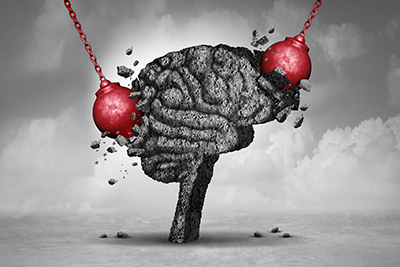A traumatic brain injury (TBI) occurs when a penetrating object enters the skull or when a violent impact disrupts normal brain function. This can happen during car accidents, falls, sports injuries, or assaults. Whether the skull is pierced or the head is struck with force, the brain can suffer serious and lasting damage.
Visible and Invisible Damage
One common and dangerous result of TBI is a subdural hematoma—bleeding on the brain. This bleeding creates pressure that can damage brain tissue and may require emergency surgery to evacuate the blood and relieve pressure.
But not all damage is immediately visible. On a microscopic level, TBI can stretch or tear delicate brain neurons, disrupting how the brain communicates and functions—even if imaging doesn’t show dramatic findings.
Diagnosis of TBI
Diagnosing a TBI requires a thorough evaluation of symptoms, imaging, and neuropsychological testing. Clinicians ask:
- Was there a blow to the head?
- Did the person lose consciousness or experience confusion or disorientation?
- Do MRI or other imaging results show bleeding or tissue damage?
- Are there noticeable deficits in physical, cognitive, or emotional functioning?
Even when not diagnosed immediately, brain injuries often reveal themselves over time. Initially, attention may focus on more obvious physical injuries, delaying the recognition of cognitive or emotional symptoms. Common long-term effects include:
- Chronic headaches
- Memory loss
- Motor dysfunction
- Mood instability
- Depression, anger, and confusion
Recovery typically unfolds over 18 months to 2 years. After that, progress may plateau, and some symptoms may persist permanently.
Neuropsychological Testing & Treatment
Neuropsychological tests help identify subtle but significant changes in brain function by comparing post-injury performance to pre-injury baseline (when known). These tests can reveal:
- Loss of gross and fine motor skills
- Slower processing speed
- Memory deficits (verbal and spatial)
- Mood swings or emotional instability
Severe TBI often requires a multidisciplinary approach, including:
- Cognitive rehabilitation
- Medication management
- Vocational retraining
- Psychological and psychiatric care
Family members frequently need support too, as they face the emotional and logistical challenges of caring for a loved one with a serious brain injury.
TBI and Long-Term Risks
TBI isn’t just a single event—it can set off a neurodegenerative process that causes cognitive decline over a person’s lifetime. A second brain injury—especially when layered on a previous one—can cause devastating and irreversible consequences.
The goal is always to return home and resume a meaningful, independent life. But severe injuries can impair a person’s ability to work, maintain independence, or care for themselves long-term. Some individuals eventually require supervised living arrangements or in-patient care.
Pursuing a Legal Claim for TBI
When someone else’s negligence causes a traumatic brain injury, the law provides a path to recover compensation. Victims may seek damages for:
- Medical care (past and future)
- Lost wages and earning capacity
- Pain and suffering
- Mental health treatment
- Loss of enjoyment of life
- Loss of consortium
Successfully proving a TBI case requires experienced legal representation. The Vigna Law Group treats clients like family. We leave no detail unexamined. Our team aggressively investigates each case—gathering medical evidence, consulting top experts, conducting depositions, and pursuing trial if necessary.



